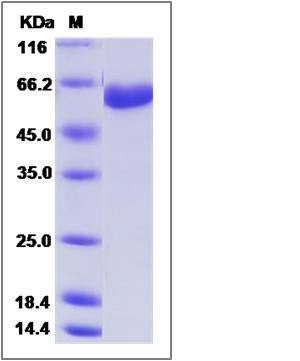Influenza A H7N9 (A/Hangzhou/3/2013) Hemagglutinin / HA Protein (His Tag)
HA
- 100ug (NPP1512) Please inquiry
| Catalog Number | P40123-V08B |
|---|---|
| Organism Species | H7N9 |
| Host | Baculovirus-Insect cells |
| Synonyms | HA |
| Molecular Weight | The recombinant hemagglutinin of Influenza A virus (A/Hangzhou/3/2013(H7N9)) comprises 517 amino acids and has a predicted molecular mass of 57.6 kDa. The apparent molecular mass of the protein is approximately 58 kDa in SDS-PAGE under reducing conditions. |
| predicted N | Asp 19 |
| SDS-PAGE |  |
| Purity | > 95 % as determined by SDS-PAGE |
| Protein Construction | A DNA sequence encoding the Influenza A virus (A/Hangzhou/3/2013(H7N9)) hemagglutinin (EPI442713) (Met1-Val524) was expressed with a C-terminal polyhistidine tag. |
| Bio-activity | 1. Measured by its ability to agglutinate guinea pig red blood cells. HA titer is 2-10 ng/mL for 1% GRBC. It also agglutinates chick red blood cells. 2. Measured by its ability to bind with Neu5Aca2-3Galb1-4GlcNAcb-PAA-biotin (01-077) using the Octet RED System. 3. Measured by its ability to bind with Neu5Aca2-6GalNAca-PAA-biotin (01-059) using the Octet RED System. |
| Research Area | Microbiology |Pathogenic microorganism |viruses |animal virus |viral illness |Viral tract respiratory illness | |
| Formulation | Lyophilized from sterile 20mM, Tris 500mM NaCl, 10% glycerol, pH 7.4. 1. Normally 5 % - 8 % trehalose, mannitol and 0.01% Tween80 are added as protectants before lyophilization. Specific concentrations are included in the hardcopy of COA. |
| Background | |
| Reference |
